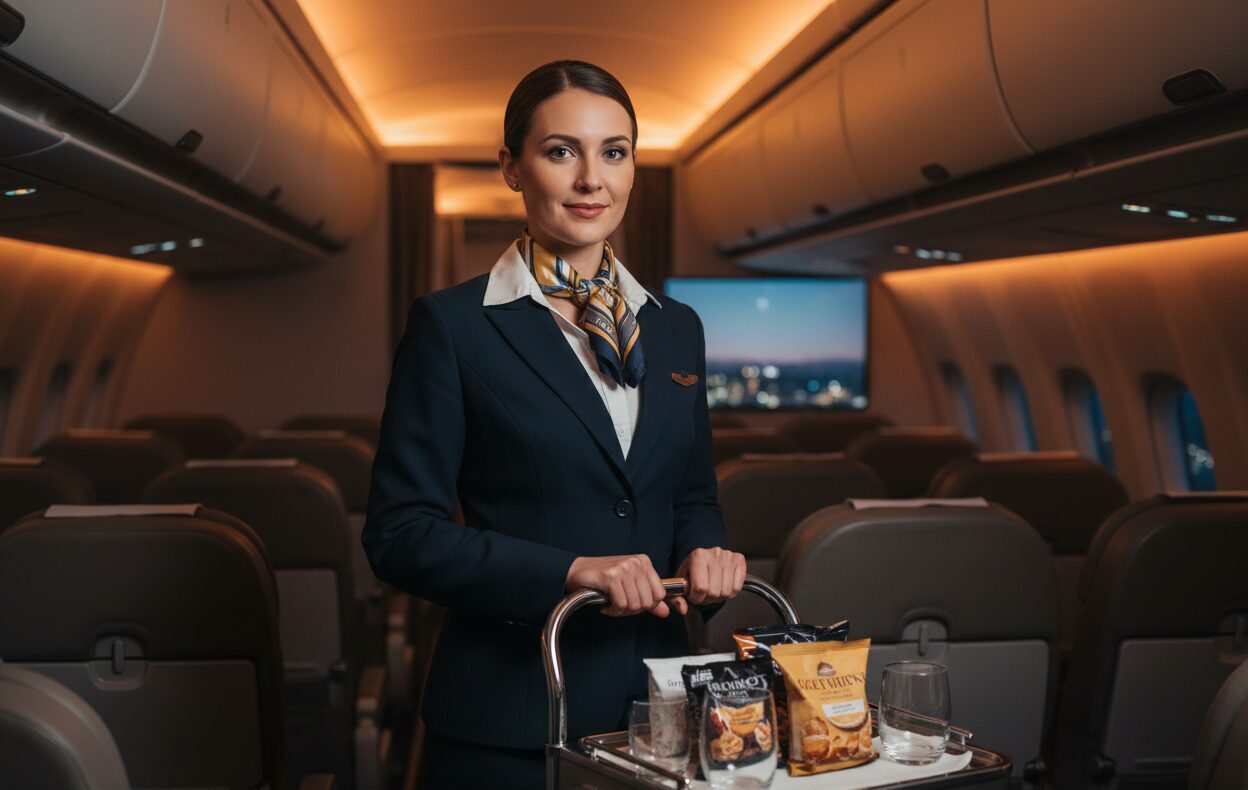A cabin crew career attracts people who dream of traveling the world. However, many are unsure whether they meet the requirements or where to begin. If you have ever wondered what it takes to become cabin crew, this guide answers the most frequently asked questions based on real searches and messages we receive through our Facebook page.
Let’s get started with everything you need to know.
Table of Contents
Essential Requirements for a Cabin Crew Career
Do cabin crew members need a passport?
Yes. A valid passport is absolutely essential because cabin crew members travel to multiple countries while on duty.
What is the minimum age to work as cabin crew?
The minimum age is usually 18. However, certain airlines or regions may require candidates to be at least 21 years old. In most cases, 18 is the baseline to begin training and employment.
Do I need a college degree to become cabin crew?
No, a high school diploma is typically enough for entry-level cabin crew positions. A college degree may be useful if you want to progress into supervisory or senior roles in the future.
Do I need training before joining an airline?
This depends on the airline. Some airlines provide their own training to candidates with no previous experience. Ryanair and Wizz Air, for example, offer training programs but may require a contract commitment. You can also attend independent training centers such as BAA Training to prepare before applying. For full details on what cabin crew training covers, check our Guide to Cabin Crew training: what you need to know.
Appearance and Physical Requirements for Cabin Crew
Can cabin crew members have tattoos?
Visible tattoos are generally not allowed. Areas such as the neck, face, hands, wrists, and legs below the knees should remain free of tattoos to maintain a professional appearance and avoid cultural misunderstandings.
Can tattoos be covered up when working as cabin crew?
Some airlines allow coverups and others do not. During recruitment, applicants may be asked directly about tattoos. Professionalism and honesty are important, but visible tattoos can reduce your chances of being hired.
What are the height requirements for cabin crew?
The minimum height is usually around 158 cm or 5.2 feet. A reach of at least 210 cm or 6.10 feet is also required to operate overhead compartments safely.
Do I need to know how to swim for a cabin crew career?
Yes. Most airlines require cabin crew members to swim at least 25 meters unassisted. Although emergencies are rare, this requirement forms part of aviation safety standards.
Can cabin crew wear braces?
Some airlines prefer a clean, professional smile and may discourage visible braces. However, braces do not usually prevent someone from being hired.
Work Environment and Job Opportunities for Cabin Crew
How do I find cabin crew jobs?
You can apply directly through airline career pages or aviation job platforms such as AviationCV. Some airlines use online assessments or dedicated recruitment events. It is important to never pay for training before receiving an official employment offer because this may be a scam. When applying, make sure your CV stands out with our guide on How to write a Cabin Crew CV: tips for success.
Benefits of a Cabin Crew Career
A cabin crew career offers the chance to travel the world, meet new people, and experience different cultures. Many airlines provide flexible schedules and discounted flight tickets for employees. Compared to typical office jobs, cabin crew work environments are dynamic and socially engaging. For even more detailed answers on lifestyle and long-term career questions, explore our Top 20 FAQs about the cabin crew career answered.
Frequently Asked Questions About Cabin Crew Careers
Is there a language requirement to become cabin crew?
Yes. Fluency in English is essential. Additional languages can be a strong advantage, especially for international airlines.
Do cabin crew members work full-time?
Most cabin crew roles are full-time but schedules often include nights, weekends, and holidays.
Can a criminal record affect my chances of becoming cabin crew?
Yes. Airlines conduct background checks. Certain convictions may affect eligibility depending on airline policy and local regulations.
Do airlines provide healthcare or insurance for cabin crew?
Most airlines offer healthcare and insurance benefits, although the specifics depend on the company.
Conclusion
A cabin crew career is more than just a profession. It is an exciting lifestyle filled with travel, personal growth, and new experiences. Although the role requires discipline, strong communication skills, and a commitment to safety, cabin crew professionals enjoy independence, flexibility, and a dynamic workplace that very few careers can offer. If you enjoy working with people and adapting to new situations, this career could be the launchpad for your future in aviation. For a complete checklist of everything you need, see our Top 10 essential steps to embark on a cabin crew career.

